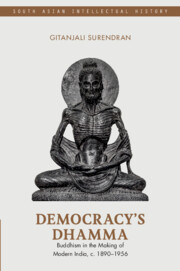
- Publisher:
- Cambridge University Press
- Online publication date:
- November 2024
- Print publication year:
- 2025
- Online ISBN:
- 9781009424974

In 1956, B. R. Ambedkar publicly converted to Buddhism raising questions about his turn from constitutionalism to religion. The answer lies in Buddhism itself. In the late colonial era, the struggle to produce an appropriate Buddhism for a nation-in-the-making reveals a secret history foundational to modern India. Thinkers, activists, reformers, pilgrims, and monks from around South, Southeast and East Asia discussed universalism, nationalism, modernity, democracy, and caste radicalism and advocated an Indian return to Buddhism and the Buddha. This book traces this genealogy through the Buddhist itineraries and political projects of figures like Anagarika Dharmapala, Swami Vivekananda, Rabindranath Tagore, Jawaharlal Nehru, Vinayak D. Savarkar, Rahul Sankrityayan and Ambedkar, to reveal how Buddhism emerged as democracy's dhamma, the religion of democracy.
‘Democracy’s Dhamma is a lively account of the emergence of what we might call a modern Buddhist cosmos in South and South-east Asia. Through the mapping of pilgrimage and memory circuits, tales of unusual lives and journeys into the dhamma, and a review of ideas to do with Buddhism in the time of democracy and socialism, Gitanjali Surendran has created an unusual diorama-for us to re-examine the making of modern India. Buddhism by the Bay (of Bengal), a formulation that the book invokes, helps situate anti-colonial and anti-caste thought and struggles in India within a wider and older geography.’
V. Geetha - feminist historian and writer, author of Bhimrao Ramji Ambedkar and the Question of Socialism in India (2021)
‘Surendran’s volume offers a robust account of Buddhism as a philosophical movement that has historically progressed and continues to be a presence in the intellectual and social life of South Asia …. She makes painstaking efforts to draw many leading thinkers from modern India in the interpretative framework of Buddhism. It makes for a fresh and hence fascinating reading of Buddhism in South Asia.’
Gopal Guru - former professor, Jawaharlal Nehru University
‘Democracy’s Dhamma expertly details the remarkable networks and projects of the South and Southeast Asian activists, scholars and pilgrims who brought Buddhism back to its birthplace. Matching scholarly insight with writerly elegance, Surendran demonstrates how essential the re-emergence of Buddhism was to the project of Indian democracy itself, from what she strikingly analyses as Nehru’s ’civil religion’ to Ambedkar’s poignant vision of fraternity and democratic social life.’
Karuna Mantena - professor of Political Science, Columbia University
‘The rediscovery of India’s Buddhist heritage-a global enterprise if ever there was one-is really a post-mid-19th-century development in which many remarkable personalities from South and Southeast Asia played a pivotal role. Surendran tells this fascinating story of the rediscovery of India’s Buddhist heritage especially-one that was to have a deep and enduring impact on India’s nationalist movement as is evident in, for instance, the choice of the national flag and the national symbol …’
Jairam Ramesh - member of parliament, former minister and author
 Loading metrics...
Loading metrics...
* Views captured on Cambridge Core between #date#. This data will be updated every 24 hours.
Usage data cannot currently be displayed.